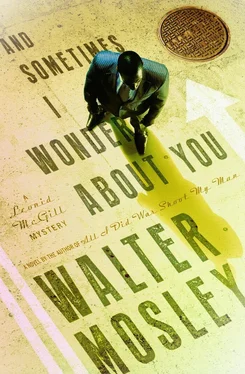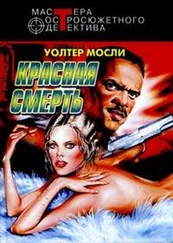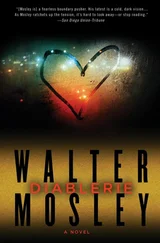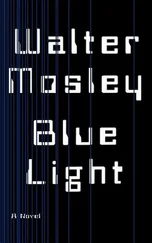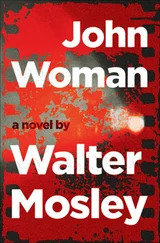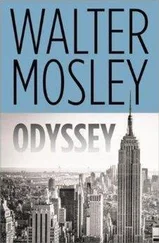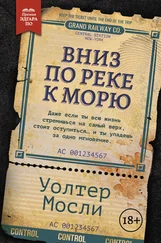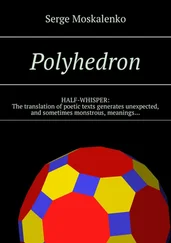“By finding, locating Celia Landis.”
I was half convinced that Stent had lost his mind from sorrow, homelessness, and alcohol consumption. But then he uttered a real name. I wondered if there was an actual person attached to the name.
“And who is that?” I asked.
“I don’t know. I mean I’ve never met her.”
“Then why are you looking for her?”
“A guy, a man named Bernard Shonefeld, sent a letter to my old address and a neighbor who knew me sent it on to my post office box. You know I keep that box in case my children ever need me — they’ll know how to find me.”
“Bernard Shonefeld,” I said.
“He’s doing work for a law firm in San Francisco — Briscoe/Thyme. They’re looking for this Celia Landis woman... young woman. I think she’s twenty-eight or — nine. That’s what Mr. Shonefeld said.”
“Why is a law firm in San Francisco asking you about a woman that you don’t know?” I was fascinated by the twists and turns of his hapless story.
“They said, Shonefeld told me that, that this Celia Landis is a distant cousin on my mother’s side. I never heard of her but Briscoe/Thyme had been looking for her for a long time, eleven months, and all they could locate was me.”
“What did they say they wanted with Celia?” I asked.
“Her grandfather, on the other side of her family, people I’m not related to, died and left her many millions of dollars. The estate tasked the lawyers to find her for a ten percent fee. Shonefeld told me that they’d give me ten percent of that if I could find her.”
“Did this Shonefeld ask you for money?” I asked.
“No. No. He just said that I should find her and I’d get ten percent of ten percent of over a hundred million dollars. That’s at least a million, more than enough to go down to Miami and get Lois and the kids back.
“I used the computers at the New York Public Library to try and find her through the genealogy search engines. But there wasn’t anything. I tried every kind of search but there was nothing.”
“Did you try asking your mother?” I asked.
“Mom died when I was seventeen and she was estranged from her family because they didn’t like my dad because he was Catholic. He’s dead too. Dad’s family is from Canada somewhere and I’m an only child. But I did find one of Mom’s sisters in Newark. I called out there and told her that I was looking for Celia because I didn’t have any family and I heard she might be in New York. Mr. Shonefeld told me that he believed that she was in New York. She, my aunt Charlotte, said that she had a picture of Celia from a high school graduation photograph. She said that she’d sell it to me for seventy-five dollars. After that I did day work and collected bottles until I had enough to take a train out there and buy the picture.”
From the breast pocket of his threadbare brown suit he brought out a tattered square of paper. He stood up and leaned across the desk to hand it to me. It was a snapshot of a pretty girl, somewhere in her late teens, with long brown hair and red lips. She was smiling at the camera, pushing her left shoulder forward in an inviting way.
“You paid seventy-five dollars for this? Why?”
“I thought maybe a private detective could find her. I mean that’s what she looks like and she comes from around Princeton, New Jersey.”
“Did you look?” I asked.
“Just on the Internet and in the phone book. She’s not there and Aunt Charlotte said that most of her family is dead or in the wind. That’s the words she used — ‘either dead or in the wind.’ ”
“And what do you want from me?”
“Find her, Mr. McGill. You’re a detective. You can do things that I don’t know about just like I can work with monies in ways that you probably don’t understand.”
“Speaking of money,” I said. “How do you plan to pay for my services?”
“Ten percent.”
“Ten percent of ten percent of ten percent?”
“I figure that to be a little more than a hundred thousand dollars,” he said, his voice filled with impossible hope.
“Mr. McGill, are you in?” Mardi Bitterman said over the intercom.
“Hey, Mardi, I’m back here with Mr. Stent.”
“You’re in early.”
“Earlier than you,” I said with just a hint of satisfaction in my voice.
Then I turned my attention back to the homeless man who dreamed about millions. If I were ever to teach a class on being a PI the first thing I’d say is to never take a case like Stent’s. There’s no percentage in it — ten or otherwise.
“I can’t help you, Mr. Stent,” I said.
“I’ll sign any contract you want.”
“It’s not that. It’s not that you’re unemployed or distressed or lost. I like you. I feel for your predicament but I don’t believe that what this man is telling you is true.”
“I have the letter.”
“I’m sure you do. I’m sure there’s a Celia Landis out there somewhere and that some man calling himself Shonefeld is looking for her. But wealthy people don’t offer poor people a million dollars for a name and an address; not unless there’s something hinky going on.”
“But they said that they’re looking for her. What other reason could they have?”
I stood up and walked around the desk, handed Hiram back his frayed photograph, and gestured for him to stand.
“What am I going to do?” he asked as if I was his only friend in the world.
Maybe I was.
“I don’t know what to tell you, Hiram. I can’t take this case because, in my professional opinion, something in this story stinks.”
“But...”
I put my hand on his shoulder and he stopped talking. I walked him down the untenanted aisle, past Mardi’s desk, and through the front door.
He never said another word.
I watched Hiram Stent walk down the hallway toward the elevators. He didn’t look back. I almost called to him. After all, I had money from Camille Esterhouse and Marella Herzog (if indeed that was her real name). I could afford to do a good deed for some poor schlub down on his luck. But the truth was that Hiram couldn’t be helped. Whatever I did, it would just turn out bad.
“How are you this morning, Mr. McGill?” Mardi asked my back as Stent turned the corner.
I closed the door and turned to my pale assistant, slight and white. Her gray-blue eyes carried all the sadness of the last days of autumn and her voice was so soft that it could have been a memory.
“Fine,” I said. “And you?”
“I’m okay.”
“How’s your sister?”
“Just entered middle school. She loves the ocean and wants to be an oceanographer.”
I sat down in one of the blue-and-chrome visitor’s chairs that used to be in my office.
“You’re hardly ever in this early anymore,” she said.
“I used to be this early?”
“Mmmm-hm. When I first worked here.”
She was right. My schedule had slowly shifted since Mardi began to shoulder some of the responsibility. She had been Twill’s classmate. Barely in her twenties and she made more difference in my life than almost anyone ever had.
“Now that I’m here you can tell me about it,” I said.
“About what?” she said, searching her desk for something to do with her hands.
“Twill.”
She picked up a bright yellow disposable mechanical pencil and set it in a ceramic mug used to hold such things. This process took just long enough for the door buzzer to sound.
I was sure that it was Hiram Stent come back to beg me. I would have probably given him a day or two — after all, failure is a big part of being human.
“It’s Ms. Ullman,” Mardi said, looking down at the monitor I had installed in her desk drawer.
Читать дальше
